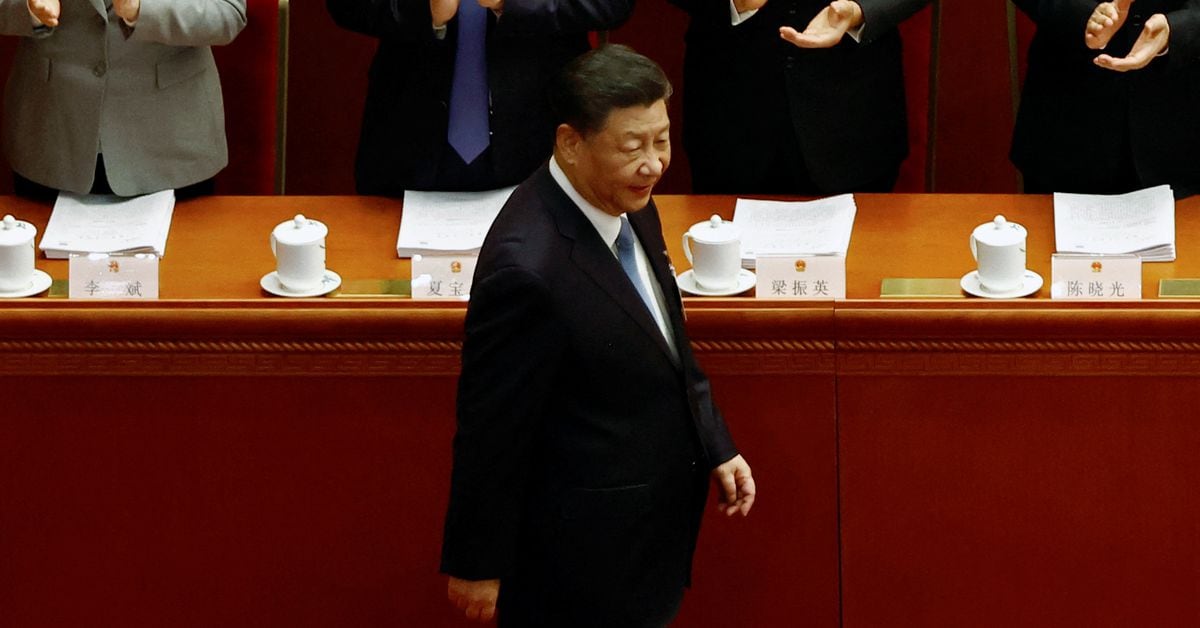An unusual and mostly forgotten pledge Chinese President Xi Jinping signed eight years ago that China would protect Ukraine in the event of a nuclear attack is getting fresh attention following Russia’s invasion of its Eastern European neighbor.
China’s 2013 promise to Ukraine of unspecified security guarantees echoed the kind of commitment nuclear-armed states—including China—have long made to nonnuclear ones, assurances that the U.S., U.K. and Russia had earlier also extended directly to Ukraine for relinquishing Soviet-era weapons. Yet Beijing appeared to be promising more than it had in past commitments, and why it singled out Ukraine for such an arrangement has confounded nuclear experts ever since.
Now, its existence appears to further muddy Beijing’s policy stance in the context of Russia’s recent invasion of Ukraine and Moscow’s warning last month it was raising the alert level of its nuclear forces.
“It’s a promise of a nuclear-weapon state to stand up for a nonnuclear-weapon state being threatened by a nuclear-weapon state,” says Gregory Kulacki, a Japan-based analyst who focuses on nuclear issues and China for the nonprofit Union of Concerned Scientists. “It means something and it should be pointed out to China,” he says.
When it was signed, China’s bilateral security promise to Ukraine appeared unprecedented, and immediately sparked questions over whether Mr. Xi, then new in his leadership role, intended to alter established military protocols. China is believed to have only one formal alliance, a 1961 pact with North Korea that doesn’t specify nuclear threats, in part because it predates even China’s first nuclear weapons test.
In its 2013 guarantees, Beijing praised Ukraine’s 1994 agreement to give up thousands of nuclear weapons from its time as a Soviet republic in exchange for security assurances from the U.S., U.K. and Russia. “China pledges unconditionally not to use or threaten to use nuclear weapons against nonnuclear Ukraine, and under the conditions of Ukraine suffering an invasion using nuclear weapons or suffering the threat of such kind of invasion, to provide Ukraine with corresponding security guarantees,” the statement said.
Initially, some government-run media in China, including the official Xinhua News Agency, stirred anxiety by dubbing Beijing’s agreement with Ukraine a “nuclear umbrella,” the term Washington uses to describe its vows to protect allies like South Korea. Several experts say umbrella is a vast exaggeration of the scope of Beijing’s pledge, and many of the original Chinese news reports have since disappeared from the internet.
“Umbrella is not accurate. If it were true, that would be a very consequential matter,” said Gerald C. Brown, a Washington defense analyst who specializes in China and nuclear weapons. He said nuclear umbrella is a uniquely American concept.
Beijing’s official language opposing nuclear umbrellas hasn’t changed in decades and is published on the website of its Ministry of Foreign Affairs: China “has neither deployed nuclear weapons in territories of other countries nor provided nuclear umbrella for any countries.”
As missiles rain down on Ukraine, one challenge in interpreting China’s intent: Beijing appears not to have published an official English-language translation of the agreement. Some words in the agreement—including bao zheng, which has been widely translated as “guarantee”—can have subtly different meanings.
When the U.S. offered its nuclear security pledges to Ukraine several years before China did, according to one of the U.S. negotiators, Steven Pifer, it deliberately used the more vague word “assurance” instead of the more ironclad “guarantee.”
Still, since Russia has long represented Ukraine’s primary security threat, China’s agreement seemed to suggest Beijing stood ready to oppose Moscow in such a conflict. While China describes a strategic partnership with Russia today, the two countries have often been on opposite sides of territorial issues and jostled for influence in third countries.
A reading of the Ukraine agreement now may also make it appear more adversarial to Moscow than it initially did. Ukraine’s signatory, then-President Viktor Yanukovych, enjoyed Kremlin backing and had weeks earlier balked at a partnership with the European Union—factors that propelled massive pro-Western demonstrations that forced him from power within two months of his Beijing visit.
Mr. Yanukovych’s visit to Beijing came just three months after Mr. Xi had announced plans for his Belt and Road initiative that would rebuild ancient Silk Road trade routes that linked China with Europe, some passing through Ukraine. The Ukraine leader’s state visit to Beijing also coincided with the arrival there of then-Vice President Joe Biden. It was the European leader rather than the American visitor who got top billing on China Central Television’s primary news broadcast.
But Beijing signaled its deal was with Ukraine, not Mr. Yanukovych, when China’s legislature ratified the pledge in 2015.
Intaek Han, president of the South Korean think tank Jeju Peace Institute, which promotes nonproliferation of weapons, says China’s assurances for Ukraine appear on paper to exceed those it is known to have provided to North Korea. He wonders whether Russia might have supported the pact to discourage Kyiv from aligning with the North Atlantic Treaty Organization.
Miles Yu, a senior fellow at Washington think tank Hudson Institute and adviser to former U.S. Secretary of State Mike Pompeo, has for years sought to draw attention to the 2013 agreement. He says it demonstrated tension between Beijing and Moscow, reflected Ukraine’s desire for a third alternative to Russia and the EU, and also served to solidify Chinese access to weapons systems like aircraft engines produced in Ukraine.
“China has a long strategic interest in putting Ukraine in its geopolitical orbit,” Mr. Yu says.
Asked about the 2013 Ukraine pact at a regularly scheduled news conference on March 3, a spokesman for China’s Foreign Ministry, Wang Wenbin, sidestepped the question by referring to a United Nations resolution on the security of nonnuclear states like Ukraine. “The security assurances have clear limitations on the content and are triggered under specific conditions,” Mr. Wang said.
“On the Ukraine issue, the pressing task now is for all sides to remain calm and exercise restraint, de-escalate the situation and promote [a] political settlement,” he said.
—Anniek Bao contributed to this article.
Write to James T. Areddy at
[email protected]













